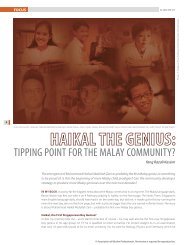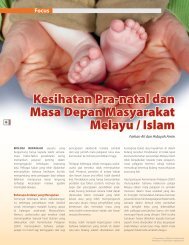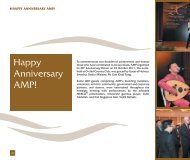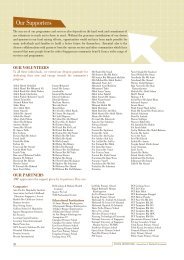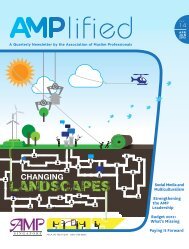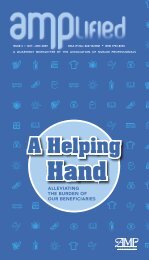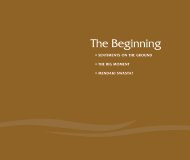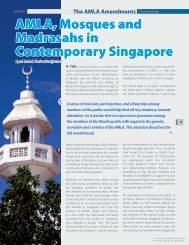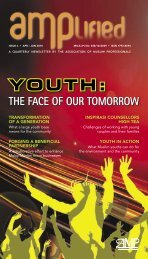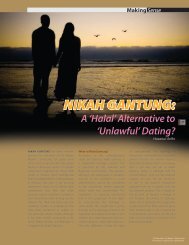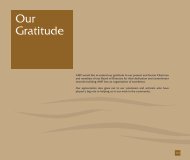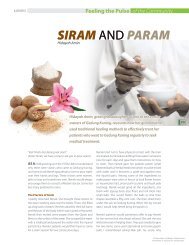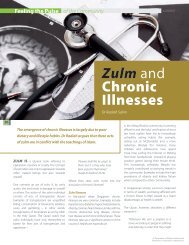The AMLA Amendments - Association of Muslim Professionals
The AMLA Amendments - Association of Muslim Professionals
The AMLA Amendments - Association of Muslim Professionals
You also want an ePaper? Increase the reach of your titles
YUMPU automatically turns print PDFs into web optimized ePapers that Google loves.
<strong>The</strong> <strong>AMLA</strong> <strong>Amendments</strong><br />
Social Resilience<br />
KARYAWAN<br />
‘It is time we start empowering men, as well as<br />
our women, to play their roles within the context<br />
<strong>of</strong> marriage and even following its dissolution.<br />
Only then can we complete part <strong>of</strong> the equation to<br />
solve the problem <strong>of</strong> dysfunctional families.’<br />
20<br />
<strong>Muslim</strong> Pr<strong>of</strong>essionals (AMP), Yayasan Mendaki, the Islamic Religious<br />
Council <strong>of</strong> Singapore (MUIS), Ain Society and many other organisations<br />
reach out to these women through education and skills upgrading<br />
programmes, financial assistance schemes and social enterprises.<br />
However, there is a need to reach out to men too. Customised efforts<br />
for husbands and ex-husbands need to drive home the message <strong>of</strong><br />
responsibility and maintenance-giving.<br />
<strong>The</strong> following are some strategies that I would like to propose:<br />
Claiming from CPF<br />
Economic vulnerability may be a major factor that impedes the men’s<br />
ability to pay maintenance and consolatory gifts. However, many <strong>of</strong><br />
our men may be cash-poor but CPF-rich. Allowing monthly payments<br />
to be made from the men’s CPF may facilitate the situation for men<br />
who cannot afford to give cash. One may argue that this runs contrary<br />
to the main aim <strong>of</strong> the CPF Scheme, which is to provide security for<br />
the account holder in old age. However, it is flexible enough to meet<br />
education, housing and medical needs. Why not for maintenancegiving<br />
We must facilitate our men to take responsibility and this<br />
might be one possible way.<br />
Thinking through Divorce and Rethinking Remarriage<br />
If divorce and its implications contribute to the problem <strong>of</strong><br />
dysfunctional families, we may consider making it compulsory for<br />
men and women to attend pre-divorce counselling. This is to help<br />
create readiness in facing divorce and its consequences. Presently it<br />
is not a legal requirement.<br />
With laws stipulating the minimum age <strong>of</strong> marriage, there are also<br />
stricter laws enforced on men who wish to enter polygamy. Men<br />
have to fulfill strict criteria before they can solemnise a second or<br />
third marriage in Singapore. Similarly, we may need to review the<br />
laws in cases <strong>of</strong> remarriage. Couples who have been married before<br />
must show pro<strong>of</strong> that they have what it takes to make this new<br />
marriage work.<br />
in their basic duties to maintain their families. In today’s context,<br />
husbands need to not only be the financial provider but also play<br />
their role in developing and bringing up their family as co-partners<br />
with their wives.<br />
It will take time and plenty <strong>of</strong> discourses and media intervention to<br />
bring about a change in thinking about gender roles. MUIS can also<br />
play a part to send an unequivocal message that it is not unIslamic<br />
for women to go out to work, and is in fact, highly encouraged in<br />
today’s context. Both men and women tend to use religion as an<br />
explanation. Religious principles must be explained in context.<br />
<strong>The</strong>re is a caveat however. Having moms who stay home may<br />
simply be the best option for many low-wage workers. A daily-rated<br />
worker or casual worker may lose an entire day’s pay if he takes<br />
time <strong>of</strong>f to bring his child to the clinic or attend a parent-teacher<br />
conference. Delineating roles and having his wife focus on the<br />
children is paramount to his ability to focus on income-generation.<br />
Furthermore, if women go out to work, women must also be<br />
prepared to contribute to the households and not expect nafkah<br />
from their husbands in cash terms (unless their husbands can afford<br />
it) alone. <strong>The</strong>re are still misconceptions about women’s nafkah.<br />
Women may overlook that emotional and sexual intimacy, shelter,<br />
clothes, food and basic necessities also form nafkah, and expect<br />
cash in hand. Women’s idea that “my money is my money” must be<br />
mediated against the realities <strong>of</strong> meeting needs in an ever-changing<br />
global society.<br />
<strong>The</strong> Missing Half <strong>of</strong> the Family Equation<br />
Tackling a problem like dysfunctional families – a massive and<br />
complex one – requires a multi-level and “many helping hands”<br />
approach. <strong>The</strong> legal system plays a big role in protecting the rights<br />
<strong>of</strong> the people it governs, but implementation in its true spirit cannot<br />
take place without the right values, attitudes and capacities.<br />
Reviewing Gender Roles in Marriage<br />
Mdm Halimah Yaacob, MP for Jurong GRC, raised her concern in<br />
Parliament about the prevalent thinking that men should be the<br />
sole breadwinners. Based on my experience, many Malay men,<br />
young and old, prefer their wives to stay home.<br />
Women today are more educated and may not accept the<br />
subservient spousal role especially in the context where men fail<br />
It is time we start empowering men, as well as our women, to play<br />
their roles within the context <strong>of</strong> marriage and even following its<br />
dissolution. Only then can we complete part <strong>of</strong> the equation to solve<br />
the problem <strong>of</strong> dysfunctional families.<br />
Raihan Ismail is the Centre Manager <strong>of</strong> INSPIRASI PPIS, a dedicated<br />
hub for marriage preparation and enrichment for minor couples<br />
who marry under <strong>Muslim</strong> law. She has eleven years <strong>of</strong> experience<br />
in the social work field. <strong>The</strong> views expressed are her own.



